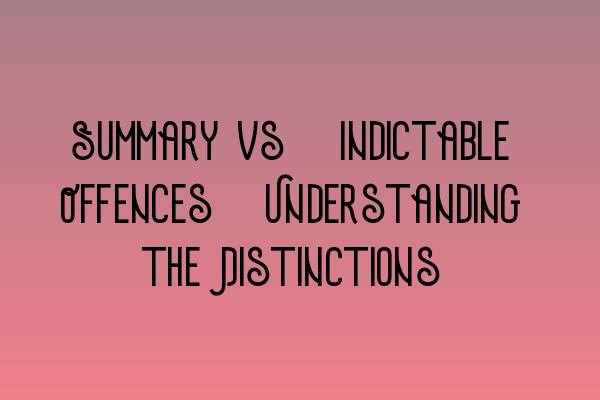Summary vs. Indictable Offences: Understanding the Distinctions
When it comes to criminal law, distinguishing between summary offences and indictable offences is an essential aspect of understanding the UK legal system. Each type of offence carries different legal procedures, sentencing options, and trial processes. In this article, we will delve into the distinctions between summary and indictable offences, providing you with a comprehensive understanding of these crucial concepts.
Summary Offences
Summary offences, also known as minor crimes, are less serious offences that are typically heard in the Magistrates’ Court. Examples of summary offences include petty theft, public intoxication, and minor traffic violations. These offences are usually dealt with quickly and efficiently, with less complex legal procedures compared to indictable offences.
One key characteristic of summary offences is that they carry a lower maximum penalty compared to indictable offences. In most cases, the maximum penalty for a summary offence is a fine and/or a short period of imprisonment. The Magistrates’ Court has the authority to hear and determine summary offences, and the trials are usually conducted by a single magistrate or a panel of magistrates.
While summary offences are generally considered less serious, it is important to note that some offences can be escalated to the Crown Court for a more severe punishment if they involve aggravating factors or have a significant impact on society.
Indictable Offences
Indictable offences, also known as serious crimes, are more severe criminal offences that are usually heard in the Crown Court. Examples of indictable offences include murder, rape, robbery, and drug trafficking. These offences carry higher maximum penalties and often involve complex legal procedures, including jury trials.
Unlike summary offences, indictable offences demand a more comprehensive investigation and preparation for trial. The Crown Court, consisting of a judge and jury, is responsible for hearing and determining the guilt or innocence of the accused during the trial. The jury, comprised of impartial members of the public, plays a crucial role in delivering a verdict based on the evidence presented.
Indictable offences can be further categorized into three main types: indictable-only offences, hybrid offences, and either-way offences.
1. Indictable-only offences: These offences can only be tried in the Crown Court and include serious crimes such as murder, manslaughter, and treason.
2. Hybrid offences: Also known as “either-way offences,” these crimes are considered more serious than summary offences but less severe than indictable-only offences. The prosecutor has the discretion to choose whether to proceed with the case in the Magistrates’ Court or the Crown Court, depending on the circumstances and severity of the offence. Examples of hybrid offences include theft, assault causing actual bodily harm, and drug possession.
3. Either-way offences: These offences can be tried in either the Magistrates’ Court or the Crown Court, depending on the defendant’s preference and the decision of the magistrate. The seriousness of either-way offences varies, and the decision on venue largely depends on factors such as the complexity of the case and the potential sentence if convicted. Examples of either-way offences include burglary, fraud, and certain driving offences.
The Importance of Understanding the Distinctions
Having a clear understanding of the distinctions between summary and indictable offences is crucial for individuals involved in the criminal justice system, including lawyers, defendants, and even the general public. The differences in legal procedures, sentencing options, and trial processes ensure that justice is served appropriately, taking into account the severity of the offence.
For legal practitioners, understanding these distinctions is essential for providing accurate advice to clients, determining the appropriate course of legal action, and ensuring fair representation during criminal proceedings.
For defendants, understanding the categorization of the offence they are charged with can help them prepare their defense strategy and make informed decisions regarding their legal representation. It also provides them with insights into the potential penalties they may face if convicted.
For the general public, understanding the distinctions between summary and indictable offences fosters a better understanding of the criminal justice system and can help individuals navigate legal processes effectively, should they encounter a situation that involves criminal charges.
Overall, comprehending the differences between summary and indictable offences is fundamental to engaging with the criminal justice system knowledgeably and ensuring that legal rights are protected.
For more insights into legal topics, check out our related articles:
- Essentials of Consideration: Understanding the Backbone of Contracts
- Express and Implied Terms in Contracts: Decoding Agreement Components
- Mistake in Contract Law: Unraveling the Impact on Agreement Validity
- Strategies to Study Contract Law Effectively: Maximizing Your Learning Potential
- Assignment of Contracts: Rights, Obligations, and Legal Considerations
